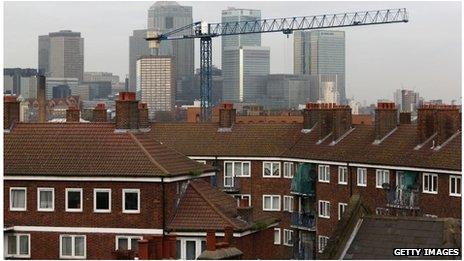Autumn statement: Chancellor takes steps to boost housing supply
- Published

The chancellor says the moves to help prviate builders will up the supply of new properties built by 250,000
The Chancellor, George Osborne, has announced a series of measures designed to increase the supply of homes.
He is changing rules to encourage councils to sell expensive properties and build more homes on cheaper sites and is raising the amount it allows them to borrow for building by £300m.
Separately, up to £1bn will be made available to unlock private developments that have "stalled".
He says that will eventually mean 250,000 more privately built homes.
The £1bn for private builders would be used for situations such as where a developer says a project has ground to a halt because of a specific reason, for example, lack of a local road.
A loan might then be arranged to pay for the problem to be fixed.
The money will be spread across six years.
Freedom
Councils say the changes announced governing their housing rules represent a "small win" for them in their long-running battle with central government for more financial freedom.
But the Chartered Institute of Housing says the steps announced today are "far too modest".
It says any increase in the housing stock could be offset by moves to sell higher value properties and other social housing to tenants under the Right to Buy scheme.
The big argument between local government and the Treasury has been over the rules on local authority borrowing.
Councils in England have long been saying that they're ready to play their part in easing the housing crisis. But to do that, they say they need to borrow more money.
The Local Government Association wanted the existing cap on borrowing abolished.
Councils would then have the freedom to borrow against their assets and revenues to get more investment into social housing.
High value sale
The government has eased the borrowing limit - up to a total of up to £300m - but not abolished it altogether.
There's one very simple reason for this. The central aim of the coalition remains to bring the deficit down, and reduce the speed at which the nation's debts are growing.
But, under the UK's accounting rules, council debt shows up on the national balance sheet. Ministers are worried that total freedom for councils to borrow would push the UK further into the red.
Under this system, each council will be able to bid for its individual borrowing cap to be increased.
The government will then decide whether the authority is making the best use of its assets, as a condition for authorising the loan.
Councils will be told to make more of their own land available for building, and sell-off higher value empty properties to generate revenue. If they are doing these things, they will have extra revenue to spend on housing and be granted more borrowing freedom.
As to where the borrowing comes from will be up to the councils. They will then decide which finance options give them the best rates.